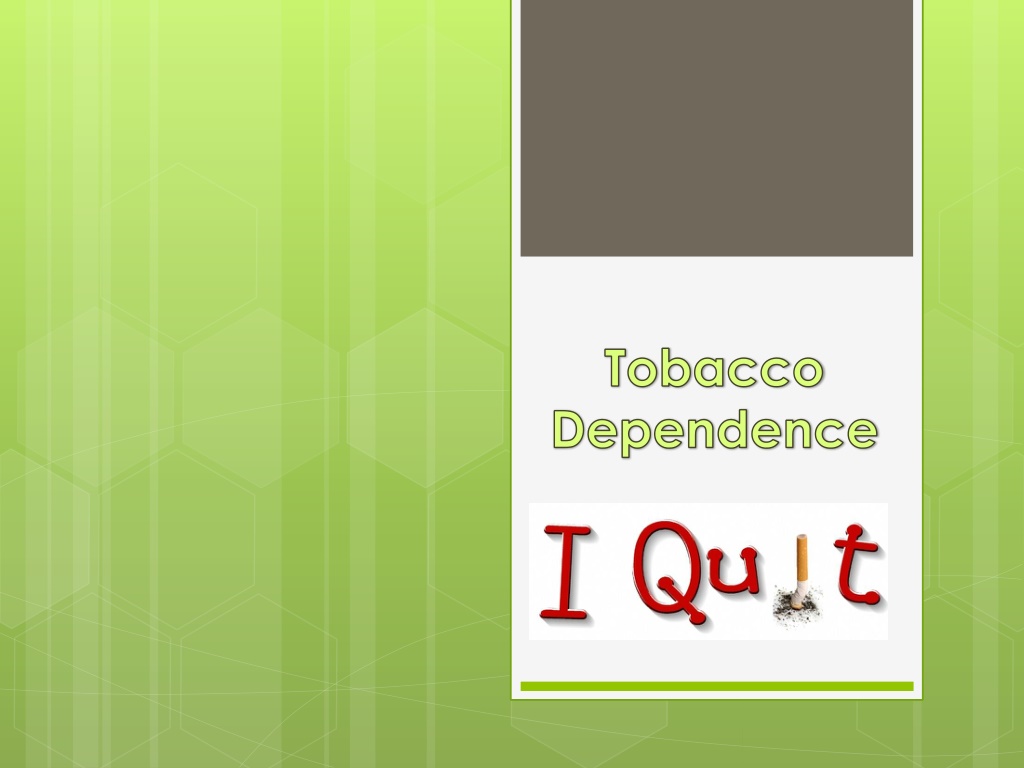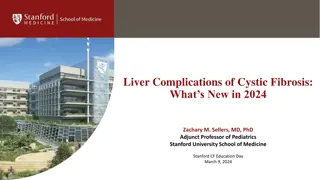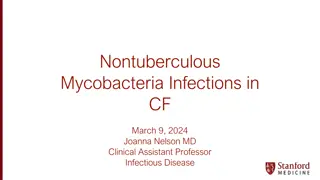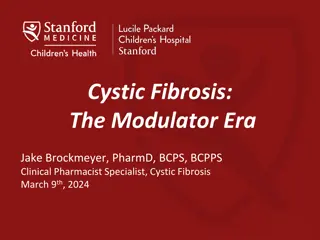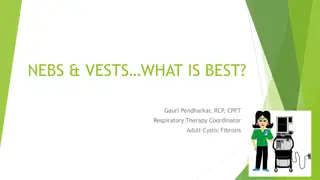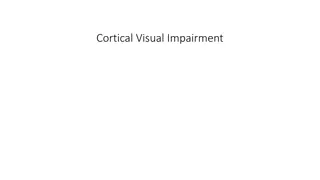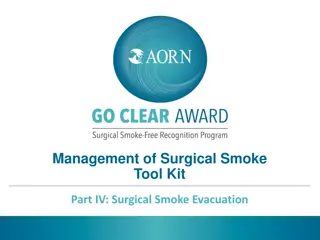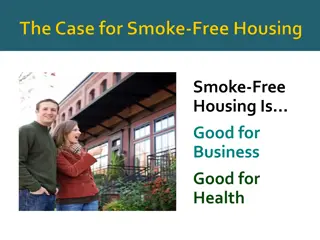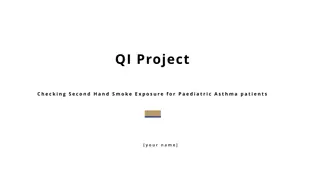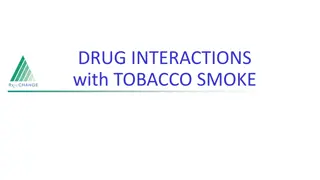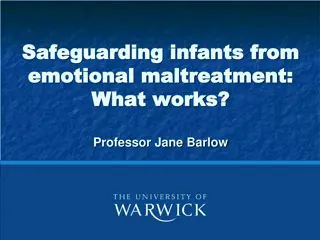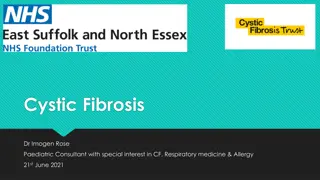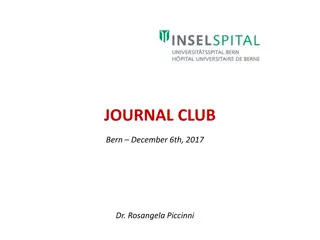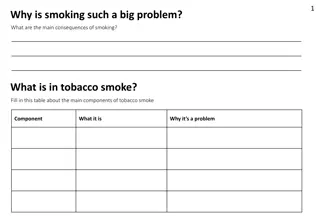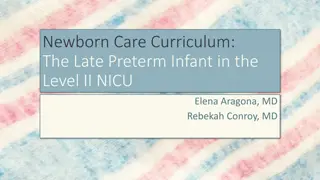Understanding the Impact of Secondhand Smoke on Infants with Cystic Fibrosis
Studying infants with cystic fibrosis exposed to secondhand smoke revealed that those in smoke-free homes experienced better growth and lower risk of bacterial infections compared to those with smoking parents. Creating a quit plan for smokers is essential to improve health outcomes and prevent related diseases. Quitting smoking can lead to significant benefits such as saving money, improving health, and reducing the risk of cancer.
Download Presentation

Please find below an Image/Link to download the presentation.
The content on the website is provided AS IS for your information and personal use only. It may not be sold, licensed, or shared on other websites without obtaining consent from the author. Download presentation by click this link. If you encounter any issues during the download, it is possible that the publisher has removed the file from their server.
E N D
Presentation Transcript
Tobacco Dependence
Link Between Secondhand Smoke and Growth in CF Patients by: Pulmonary Medicine and Infectious Diseases at Nationwide Children s Hospital
Studied infants with cystic fibrosis between 2008-2012 Of 75 infants in the study, 44 percent had at least one parent who smoked in the home. Examined growth, lung function, chest CT scans and the incidence of bacterial infection at age 4 months and 1 year, then compared the data between infants exposed to secondhand smoke and those who weren t
Infants in smoke-free homes grew about 50 percent more during their first year than infants whose parents smoked. While no CF patients in non-smoking homes tested positive for MRSA during their first year, as many as 30 percent of infants exposed to secondhand smoke tested positive for the pathogen.
Coming up with a Quit Plan for those who smoke
Step One Half of all smokers die prematurely from smoking related disease by an average of 14 years. What would you be able to do with those extra 14 years? What are the benefits of quitting?
Step Two Reasons to quit Save money Improve health Whiter teeth Improve physical performance Reduce complications from illness Healthier baby Set an example for friends, family, and children Get better health insurance Clothes and breath smell better Much less chance of lung and oral cancer
Step Three Enjoying life without nicotine What are some healthy activities that might also make you feel relaxed, focused, calm and steady? Reading Listening to music Playing with kids Exercising
Step Four Why do people smoke? Stimulation Handling Pleasure Relaxation Craving Habit
Next to the following statements, mark the number that best describes your own experience. (5=Always, 4=Most of the time, 3=Once in a while, 2=Rarely, 1=Never) ___ A. I smoke to keep myself from slowing down. ___ B. Handling a cigarette is part of the enjoyment of smoking it. ___ C. Smoking is pleasant and relaxing. ___ D. I light up a cigarette when I feel angry about something. ___ E. When I am out of cigarettes, it's near-torture until I can get more. ___ F. I smoke automatically, without even being aware of it. ___ G. I smoke when people around me are smoking. ___ H. I smoke to perk myself up. ___ I. Part of my enjoyment from smoking is preparing to light up. ___ J. I get pleasure from smoking. ___ K. When I feel uncomfortable or upset, I light up a cigarette. ___ L. When I'm not smoking a cigarette, I'm very much aware of the fact. ___ M. I often light up a cigarette when one is still burning in the ashtray. ___ N. I smoke cigarettes with friends when I am having a good time. ___ O. When I smoke, part of the enjoyment is watching the smoke as I exhale. ___ P. I want a cigarette most often when I am comfortable and relaxed. ___ Q. I smoke when I am "blue" and want to take my mind off what's bothering me. ___ R. I get a real hunger for a cigarette when I haven't had one in a while. ___ S. I've found a cigarette in my mouth and haven't remembered it was there. ___ T. I always smoke when I am out with friends at a party, bar, etc. ___ U. I always smoke cigarettes to get a lift.
Step Four Cont. Tips to help with: Stimulation: Get enough rest, take a brisk walk instead of smoking when feeling sluggish, eat regular, avoid getting bored. Handling: pick up a pen when you want to reach for a cigarette, take up a hobby that keeps hands busy, have a snack such as carrot sticks, apple slices, bread sticks. Pleasure: Spend the money you save on cigarettes on another kind of pleasure, remind yourself of the health benefits of quitting.
Step 4 Cont. Tips to help with: Relaxation: Use relaxation techniques, exercise regularly, get enough rest. Craving: Nicotine replacement therapy (NRT), Keep away from cigarettes, get rid of ashtrays, destroy any cigarettes you still have, ask family and friends to help. Habit: Change smoking routine before quit day by keeping cigarettes in different place, smoke with opposite hand, when you want a cigarette wait one minute and try to think of something else instead, set a date!
Step Five Prepare for Triggers Identify all the times you use tobacco: When I m tired When I m Hungry When I m Stressed
Step Six Come up with ideas of what you could do instead of smoking when: Waking up Bored Driving After meals Drinking On the phone Stressed
Step Seven Select your quit day! My Quit Day is I WILL NOT USE TOBACCO ON THIS DAY OR ANY DAY AFTER THAT! .
Weight Gain: What you need to know Tobacco does NOT make you thin and quitting WILL NOT make you fat! There may be a slight change in metabolism when you quit Exercise can help keep metabolism from slowing You may feel hungry more often then when you used tobacco Food is going to smell better and taste better! You might want to eat to keep from using tobacco.
Dealing with Stress Make a list of things, situations, or people that stress you out and think of ways to deal with it other than smoking.
Physical Stress Reducers Stretch, practice deep breathing, close eyes and think pleasant thoughts, hot bath. Eat well and consume healthy foods Get plenty of rest. Set time aside for yourself to enjoy.
Mental Stress Reducers Take a break; let your mind relax Get organized Be good to yourself Talk to relatives, friends, or clergy about anxieties. Learn to ask for what you need
The 4 Ds Delay Do something else to distract yourself Drink a lot of water and other fluids Deep breathe
Nicotine Replacement Therapy
Face to face counseling with Tools to Quit or Quit Smoking Now classes. Talk to a quit coach 1-877-822-6669 Online Program http://www.ahectobacco.com
